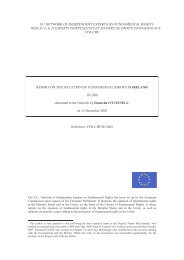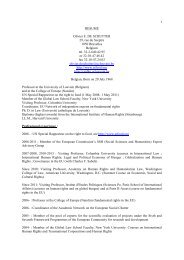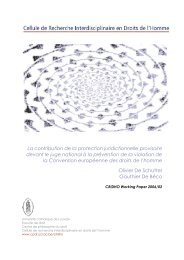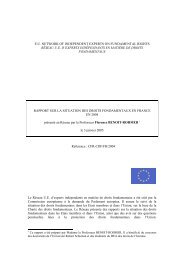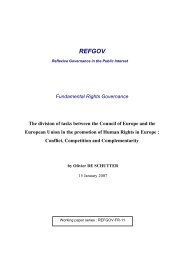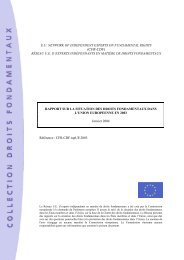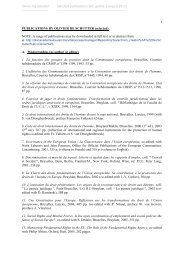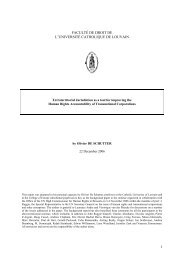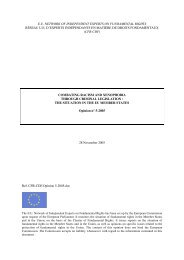The Prohibition of Discrimination under European Human ... - cridho
The Prohibition of Discrimination under European Human ... - cridho
The Prohibition of Discrimination under European Human ... - cridho
You also want an ePaper? Increase the reach of your titles
YUMPU automatically turns print PDFs into web optimized ePapers that Google loves.
thematic report<br />
■ THE PROHIBITION OF DISCRIMINATION UNDER EUROPEAN HUMAN RIGHTS LAW ■<br />
As already noted, the adoption in 2000 within the <strong>European</strong> Community <strong>of</strong> the ‘Race’ and Framework Directives<br />
have influenced both the <strong>European</strong> Court <strong>of</strong> <strong>Human</strong> Rights in its interpretation <strong>of</strong> Article 14 ECHR and the<br />
<strong>European</strong> Committee <strong>of</strong> Social Rights : the insistence by the <strong>European</strong> Court <strong>of</strong> <strong>Human</strong> Rights in Nachova on the<br />
need to adapt the evidentiary rules to facilitate the pro<strong>of</strong> <strong>of</strong> discrimination is explicitly related by the Court to the<br />
EC Directives ; when presented with reports by Member States <strong>of</strong> the <strong>European</strong> Union, the <strong>European</strong> Committee <strong>of</strong><br />
Social Rights insists that, in order to promote the full effectiveness <strong>of</strong> the efforts to combat discrimination<br />
according to Article 1 § 2 <strong>of</strong> the (Revised) Charter, the States having accepted that provision should implement<br />
fully the ‘Race’ and Framework Directives, especially the procedural clauses there<strong>of</strong> relating to the role <strong>of</strong><br />
organisations having an interest in combating discrimination and, in the context <strong>of</strong> the ‘Race’ Directive, <strong>of</strong> equality<br />
bodies. Here, it is the reverse question we are asking : what influence may the case-law briefly described exercise<br />
on the interpretation <strong>of</strong> the Directives adopted on the basis <strong>of</strong> Article 13 EC ?<br />
A first observation which is to be made concerns the consequences <strong>of</strong> the choice by the Member States which<br />
ratified the Treaty <strong>of</strong> Amsterdam to provide for a power by the Council to adopt measures against discrimination<br />
based on a limited number <strong>of</strong> grounds : race or ethnic origin, sex, sexual orientation, religion or belief, disability<br />
and age ; and <strong>of</strong> the choice <strong>of</strong> the Council, later, to <strong>of</strong>fer a broader protection against discrimination based on race<br />
or ethnic origin, than on the other grounds mentioned in Article 13 EC. As we have seen, the <strong>European</strong> Committee<br />
<strong>of</strong> Social Rights has on occasion insisted that the legal framework prohibiting discrimination in employment must<br />
protect from discrimination either on all grounds or, at least, on the grounds <strong>of</strong> political opinion, religion, race,<br />
language, sex, age and health. We are left to wonder, then, whether the omission <strong>of</strong> both political opinion and<br />
language from Article 13 EC and, therefore, from the Directives, will not create a risk <strong>of</strong> non-compliance with Article<br />
1 para. 2 <strong>of</strong> the <strong>European</strong> Social Charter (or <strong>of</strong> the Revised <strong>European</strong> Social Charter) by the Member States having<br />
accepted that provision in either <strong>of</strong> those instruments, where they have chosen not to expand the scope <strong>of</strong> the<br />
protection afforded to persons <strong>under</strong> their jurisdiction to those grounds.We may also ask whether a prohibition <strong>of</strong><br />
discrimination based on « disability » as in Directive 2000/78/EC is sufficient, or whether it should be implemented<br />
preferably as a prohibition from discrimination based on the ground <strong>of</strong> « health » (or, perhaps, « physical or mental<br />
condition »), <strong>under</strong> a symmetrical rather than a non-symmetrical approach. Although the <strong>European</strong> Committee <strong>of</strong><br />
Social Rights has explicitly recognized that a stronger protection may be provided in respect <strong>of</strong> certain grounds<br />
(and it cited in that respect gender or membership <strong>of</strong> a race or ethnic group), it may be less justifiable for States<br />
parties to the Charter to <strong>of</strong>fer no protection at all from discrimination based on certain grounds not mentioned in<br />
the Directives. 102<br />
<strong>The</strong> following observations examine, for each ground covered by the ‘Race’ and Framework Directives, which<br />
lessons may be drawn from the case-law presented above, and – more <strong>of</strong>ten – from the case-law <strong>of</strong> the <strong>European</strong><br />
Court <strong>of</strong> <strong>Human</strong> Rights on other bases than the non-discrimination clauses <strong>of</strong> the ECHR, in order to address certain<br />
outstanding questions <strong>of</strong> interpretation <strong>of</strong> the requirements <strong>of</strong> the directives.<br />
It will be noted from the outset that Article 2(5) <strong>of</strong> the Framework Directive states that this instrument is<br />
“without prejudice to measures laid down by national law which, in a democratic society, are necessary for<br />
public security, for the maintenance <strong>of</strong> public order and the prevention <strong>of</strong> criminal <strong>of</strong>fences, for the protection <strong>of</strong><br />
health and for the protection <strong>of</strong> the rights and freedoms <strong>of</strong> others”. Although modelled on Article 9(2) ECHR,<br />
which defines the conditions <strong>under</strong> which freedom <strong>of</strong> religion may be restricted, Article 2(5) <strong>of</strong> the Framework<br />
Directive is narrower in the justifications it allows for, as it does not refer to the “protection <strong>of</strong> morals” as a<br />
legitimate objective the pursuance <strong>of</strong> which might justify restrictions to the rights attributed by the Directive.<br />
Apart from that difference (which implies that certain restrictions on religious freedom may be found in<br />
102<br />
This, it will be noted, is the position adopted by the constitutional court <strong>of</strong> Belgium (Cour d’arbitrage) (judgment n° 157/2004 on 6 October<br />
2004).<br />
38



